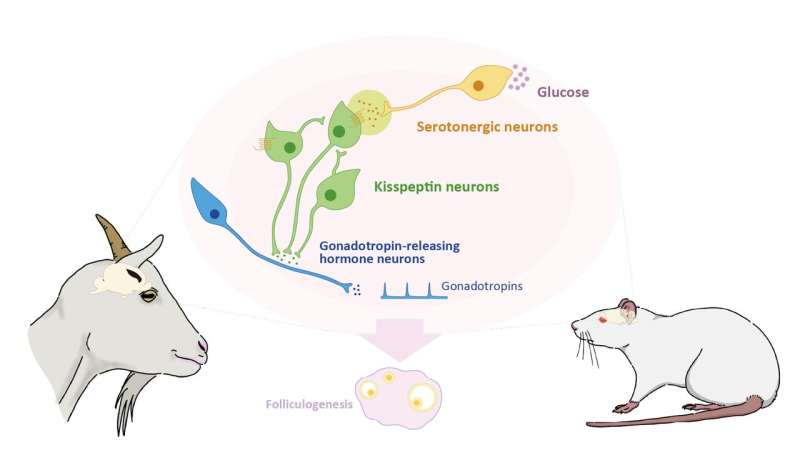This article has been reviewed according to Science X's editorial process and policies. Editors have highlighted the following attributes while ensuring the content's credibility:
fact-checked
peer-reviewed publication
trusted source
proofread
Serotonergic neuron findings suggest possible treatment for depression-related infertility

Scientists from Nagoya University in Japan have clarified the relationship between energy levels and fertility in animals and humans. They identified signaling from serotonergic neurons as important for maintaining reproductive function by sensing glucose availability and subsequently enhancing the release of the reproductive hormone gonadotropin. Their findings also provide an explanation and possible treatment for the decreased fertility observed in people with depression.
The results were published in Scientific Reports.
People who lack sufficient nutrition encounter problems with their reproductive health. For example, ballet dancers can experience menstrual disruptions and women who fast can struggle to conceive. According to a new study led by Designated Associate Professor Sho Nakamura and Professors Hiroko Tsukamura and Satoshi Ohkura, one of the main factors that affect a person's reproductive health is glucose availability.
Nakamura, Tsukamura, and their colleagues from the Graduate School of Bioagricultural Sciences at Nagoya University discovered that elevated glucose availability in rat brain stimulates serotonergic neurons. This causes the release of serotonin in the brain. Serotonin is an important neurotransmitter that affects the body and mind. It influences functions such as mood and behavior, and physiological processes such as bone health and metabolism.
When the researchers administered serotonin to goat brains, it triggered the activation of the kisspeptin neurons, which are the primary stimulator for the release of key reproductive hormones, such as gonadotropin-releasing hormone and gonadotropins.
"We used rats and goats as models because rats are a useful human model, whereas goats serve as a livestock model," said Professor Ohkura.
Their findings indicate that serotonergic neurons can release serotonin when they sense high levels of glucose. By interacting with serotonin receptors in the kisspeptin neurons, they can improve reproductive functions.
The use of inhibitors for serotonergic signaling also allowed the researchers to establish that the opposite was true. This important finding sheds light on why mammals with a poor diet face problems associated with fertility.
Depression can often be attributed to malfunctioning serotonergic neurons in the brain, which are often targeted for treatment. The dysfunction of serotonergic neurons often observed in individuals with depression suggests that low serotonergic activity might be a part of its cause.
Nakamura's research lays the groundwork for treating depression-induced infertility in humans and reproductive disorders in livestock, which implies a possible underlying connection and a potential treatment.
"Since selective serotonin reuptake inhibitors (SSRIs) are commonly prescribed to treat depression in patients, studies indicate that these drugs may also have potential benefits for addressing depression-related infertility and treating animals," said Professor Tsukamura, the Principal Investigator of the research group and corresponding author of the paper.
She proposes that SSRIs could potentially be used in the future for human and animal reproduction, or in combination with diet treatments for people with depression.
More information: Sho Nakamura et al, Raphe glucose-sensing serotonergic neurons stimulate KNDy neurons to enhance LH pulses via 5HT2CR: rat and goat studies, Scientific Reports (2024). DOI: 10.1038/s41598-024-58470-4





















